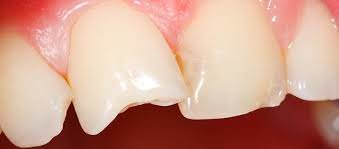Why teeth get loose
Contrary to what you might assume our teeth are not set immovably into our jaw bones. They are actually suspended in their sockets with an intricate and quite strong mesh of fibres known as the periodontal ligament.
The purpose of this is to provide some protection against damage of the teeth in the event that you bite down hard on something which is itself very hard – such as an unexpected olive stone in a pizza, or suffer an unexpected blow to the jaw resulting in the teeth banging together. The slight give in the periodontal membrane acts as a shock absorber to reduce the severity of the impact.
Now good as this set up is it is not completely fail-safe and sudden trauma to the mouth can be too much for it to resist and so a tooth can get broken or can be dislocated and subsequently loosened due to damage to the periodontal ligament fibres..
So one way your tooth or teeth might loosen is from acute trauma, say on the rugby field by a boot in the mouth or some such.

source: aboutyourteeth.com.au
Another common cause of teeth becoming loose is much slower and more insidious and is called periodontal, or gum disease. The cause of this is chronic irritation to the periodontal membrane and then to the bone of a socket containing a tooth. The irritation is caused by chemicals in bacterial waste products which set up a constant low grade inflammation in the tissues. There are several types of bacteria which can cause harm – some need oxygen and live in the plaque layer which is the thin mucus film that constantly forms on the tooth surface, and some don’t like oxygen. The latter are referred to as anaerobic and typically live just below the visible gum surface in the slight pocket that exists between the gum and the tooth. The healthy gum crevice is very shallow but with constant bacterial irritation it can gradually deepen due to destruction of the fibres comprising the periodontal membrane. If the disease process proceeds unabated the actual bone of the tooth is also gradually removed and eventually the loss of bone can cause loosening of the teeth.

source: commons.wikimedia.org
The third way teeth can loosen is by way of constant grinding of the teeth, often at night during sleep and possibly due to an anxious personality or as a reaction to stress. The force of one set of teeth against the opposing set is quite strong in a lateral direction and eventually this can cause a tooth or teeth to loosen up somewhat.
Now, all the conditions described are treatable, but, as with many health issues, they are best avoided in the first place.
If you do contact sports where damage to the teeth is possible then you should of course wear a mouth guard.
If you want to prevent gum disease it is imperative to clean your teeth thoroughly each and every day. This means for many spending a few minutes with a toothbrush and making sure in the mirror that you have brushed every surface of every tooth, i.e. both front and back to remove the sticky film of plaque where the harmful bacteria reside. You may want to follow up with flossing in order to remove the plaque right in between teeth where the brush cannot properly reach. By constantly removing bacterial plaque you never give the bacteria the chance to thrive and multiply and thus cause gum damage.

source:vimeo.com
The third situation of teeth grinding or clenching, known as bruxism, is preventable up to a point by reducing stress or by recognizing the problem and wearing a night guard during sleep in order to protect the teeth. Your dentist can havemade for you an effective soft plastic night guard that just slots over the upper or lower set of teeth.
It’s as well to take care of your adult teeth because you cannot grow (yet) a third set, and treatments for loose teeth are somewhat limited in their degree of success...